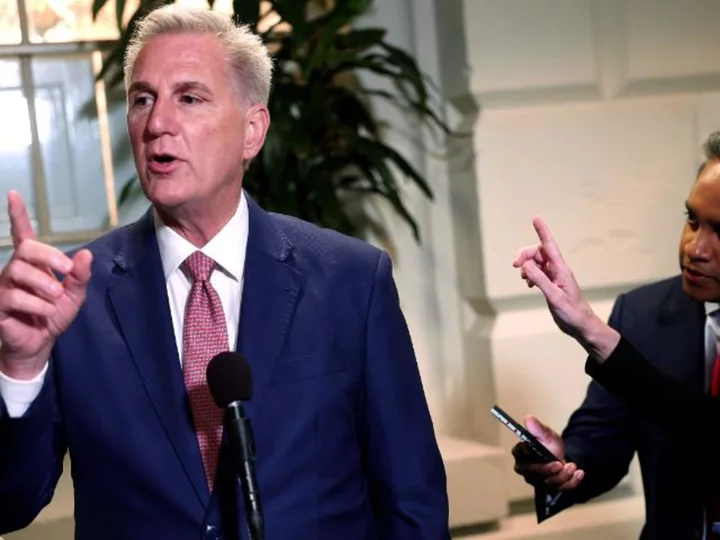With just five days to go, the House and Senate are on a collision course as a government shutdown approaches.
The Senate is working to negotiate a stopgap measure on a bipartisan basis -- but there's no guarantee it will pass in the House where a bloc of conservatives continue to rail against the prospect of a short-term funding extension.
As Congress races the clock, there is still no consensus plan to avert a shutdown and a sense of inevitability has set in as lawmakers brace for federal funding to expire at the end of the week.
Legislative text of a Senate stopgap bill has not yet been formally unveiled, though it's possible it could be released as early as Tuesday.
But Speaker Kevin McCarthy remained noncommittal Tuesday morning on whether he would put a bipartisan Senate-passed stopgap measure to avert a shutdown on the floor this week ahead of the deadline.
McCarthy repeatedly dodged the question, instead calling it a hypothetical.
"I'm not going to take up hypotheticals of someday dreaming the Senate is going to do something, when they do something come back and ask me," he insisted.
Senate leaders are moving toward a 45-day stopgap proposal, but may not be able to include much of the White House's $24 billion funding request for Ukraine given the time pressures they face to avoid a shutdown. If they include Ukraine funding, GOP Sen. Rand Paul of Kentucky has threatened to slow down the bill's passage.
Once the Senate unveils its own stopgap measure, the chamber will still need to pass it before it can be sent to the House and any one senator can slow passage under tight time constraints.
McCarthy faces leadership test in the House
Meanwhile, lacking the GOP votes to pass a stopgap bill, McCarthy is turning attention early in the week toward an effort to advance a series of spending bills, including for the departments of Defense and Homeland Security.
Passing those bills won't stop a shutdown at the end of the week, but as conservatives demand the passage of full-year funding bills, McCarthy had been hoping that momentum on the measures might swing enough holdouts to support a Republican stopgap bill. However, it is not clear that even those bills can advance amid deep divisions within the House Republican conference.
McCarthy is expected to face yet another test of his leadership on Tuesday as House GOP leadership has indicated that they plan to hold a procedural vote on a rule to advance those measures. The expected vote comes after hardliners tanked a similar procedural vote for a defense bill last week in a major embarrassment for the House GOP leaders. All eyes will be on the House to see if that spectacle repeats itself.
On Tuesday, McCarthy again slammed the hardliners that bucked the party last week and would not support a procedural motion to move forward. When pressed on if he is confident they will be in line this week, he criticized their efforts as counterproductive. "I don't understand why anybody would block the ability to secure the border, if they want to stand with President Biden by keeping the border open I think that'd be the wrong position."
McCarthy indicated that if the House is able to pass the series of spending bills it has lined up for consideration this week, then he would put a stopgap measure on the floor that includes border provisions.
"If we get through these next four, that would be 72% of all the discretionary spending. I would also this week put on the floor a continuing resolution that secures our border," he told reporters.
McCarthy remained insistent that a government shutdown is the worst possible option and warned his conference of the perils of that strategy. "I don't think shutdowns ever help," he said.
The Senate is set to take an initial procedural vote on Tuesday evening to advance the House-passed Federal Aviation Administration reauthorization bill -- which could be used as a legislative vehicle for the Senate's version of a stopgap bill to prevent a shutdown.
A stopgap funding extension could be tacked onto the FAA bill since the FAA's current authority to operate will expire at the end of September, creating another looming deadline for lawmakers to act.
A shutdown would have major impacts that would be felt across the country. If that were to happen, many government operations would come to a halt, while some services deemed "essential" would continue.
Government operations and services that continue during a shutdown are activities deemed necessary to protect public safety and national security or considered critical for other reasons. Examples of services that have continued during past shutdowns include border protection, federal law enforcement and air traffic control.
The White House on Tuesday highlighted "damaging impacts" of a shutdown that would undermine national security, pointing to the 1.3 million active-duty military members who would not be paid until the shutdown concludes and the furlough of civilian Defense Department employees.
This story has been updated with additional information.









